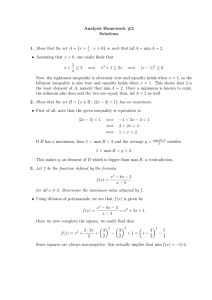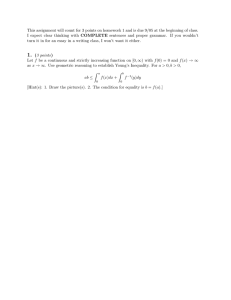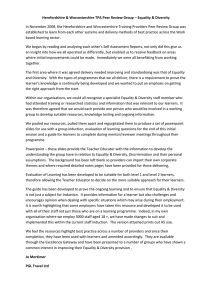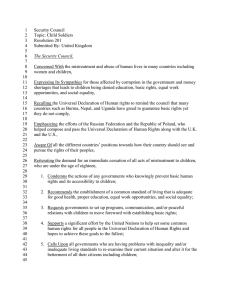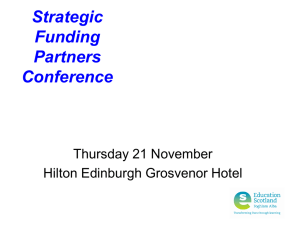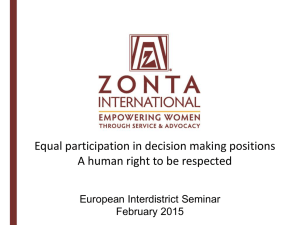Learning journey – Gender equality and woman and girls rights... Introduction:
advertisement
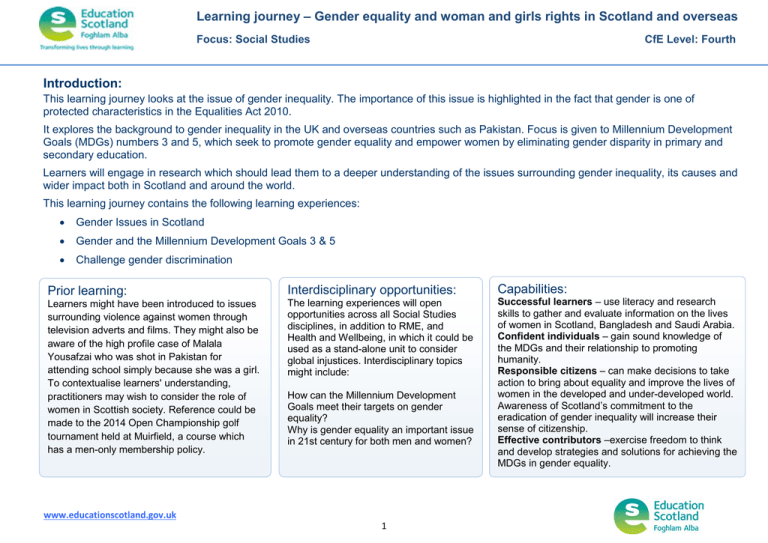
Learning journey – Gender equality and woman and girls rights in Scotland and overseas Focus: Social Studies CfE Level: Fourth Introduction: This learning journey looks at the issue of gender inequality. The importance of this issue is highlighted in the fact that gender is one of protected characteristics in the Equalities Act 2010. It explores the background to gender inequality in the UK and overseas countries such as Pakistan. Focus is given to Millennium Development Goals (MDGs) numbers 3 and 5, which seek to promote gender equality and empower women by eliminating gender disparity in primary and secondary education. Learners will engage in research which should lead them to a deeper understanding of the issues surrounding gender inequality, its causes and wider impact both in Scotland and around the world. This learning journey contains the following learning experiences: • Gender Issues in Scotland • Gender and the Millennium Development Goals 3 & 5 • Challenge gender discrimination Prior learning: Interdisciplinary opportunities: Capabilities: Learners might have been introduced to issues surrounding violence against women through television adverts and films. They might also be aware of the high profile case of Malala Yousafzai who was shot in Pakistan for attending school simply because she was a girl. To contextualise learners' understanding, practitioners may wish to consider the role of women in Scottish society. Reference could be made to the 2014 Open Championship golf tournament held at Muirfield, a course which has a men-only membership policy. The learning experiences will open opportunities across all Social Studies disciplines, in addition to RME, and Health and Wellbeing, in which it could be used as a stand-alone unit to consider global injustices. Interdisciplinary topics might include: Successful learners – use literacy and research skills to gather and evaluate information on the lives of women in Scotland, Bangladesh and Saudi Arabia. Confident individuals – gain sound knowledge of the MDGs and their relationship to promoting humanity. Responsible citizens – can make decisions to take action to bring about equality and improve the lives of women in the developed and under-developed world. Awareness of Scotland’s commitment to the eradication of gender inequality will increase their sense of citizenship. Effective contributors –exercise freedom to think and develop strategies and solutions for achieving the MDGs in gender equality. www.educationscotland.gov.uk How can the Millennium Development Goals meet their targets on gender equality? Why is gender equality an important issue in 21st century for both men and women? 1 Learning journey – Gender equality and woman and girls rights in Scotland and overseas Focus: Social Studies CfE Level: Fourth Relevant Experiences and Outcomes: Social Studies: • • • By studying groups in past societies who experienced inequality, I can explain the reasons for the inequality and evaluate how groups or individuals addressed it. SOC 404a I can describe the main features of conflicting world belief systems in the past and can present informed views on the consequences of such conflict for societies then and since. SOC 4-04b I can make reasoned judgements about how the exercise of power affects the rights and responsibilities of citizens by comparing a more democratic and a less democratic society. SOC 4-04c Health and wellbeing - Mental, emotional, social and physical wellbeing: • • • I know that friendship, caring, sharing, fairness, equality and love are important in building positive relationships. As I develop and value relationships, I care and show respect for myself and others. HWB 4-05a As I explore the rights to which I and others are entitled, I am able to exercise these rights appropriately and accept the responsibilities that go with them. I show respect for the rights of others. HWB 4-09a Through contributing my views, time and talents, I play a part in bringing about positive change in my school and wider community. HWB 4-13a Literacy and English: • • • • • • • • When I engage with others I can make a relevant contribution, ensure that everyone has an opportunity to contribute and encourage them to take account of others’ points of view or alternative solutions. I can respond in ways appropriate to my role, exploring and expanding on contributions to reflect on, clarify or adapt thinking. LIT 4-02a As I listen or watch, I can make notes and organise these to develop thinking, help retain and recall information, explore issues and create new texts, using my own words as appropriate. LIT 4-05a I can communicate in a clear, expressive manner when engaging with others within and beyond my place of learning, and can independently select and organise appropriate resources as required. LIT 4-10a To show my understanding across different areas of learning, I can: • clearly state the purpose, main concerns, concepts or arguments and use supporting detail • make inferences from key statements and state these accurately in my own words • compare and contrast different types of text. LIT 4-16a To help me develop an informed view, I can recognise persuasion and bias, identify some of the techniques used to influence my opinion, and assess the reliability of information and credibility and value of my sources. LIT 4-18a As appropriate to my purpose and type of text, I can punctuate and structure different types of sentences with sufficient accuracy, and arrange these to make meaning clear, showing straightforward relationships between paragraphs. LIT 4-22a I can justify my choice and use of layout and presentation in terms of the intended impact on my reader. LIT 4-24a By considering the type of text I am creating, I can independently select ideas and relevant information for different purposes, and organise essential information or ideas and any supporting detail in a logical order. I can use suitable vocabulary to communicate effectively with my audience. LIT 4-26a www.educationscotland.gov.uk 2 Learning journey – Gender equality and woman and girls rights in Scotland and overseas Focus: Social Studies CfE Level: Fourth C Learning experience A: Gender issues in Scotland Introduction: Possible learning opportunities / tasks Possible evidence Gender inequality is a human rights issue that concerns the position of women in all societies from suffrage (voting) and political involvement through to opportunities in the workplace, at home, in education, healthcare, freedom of movement and freedom from violation. Pupils could: • Reflect on current issues relating to Gender inequality particularly in relation to sport. For example the 2013 Gold Open event at Muirfiled. See: http://www.bbc.co.uk/sport/0/golf/23343727 • Research various aspects of gender inequality. This could include looking at the history of gender inequality, legislation surrounding equality and specific organisations that focus on gender inequality. • Carry out a Media study looking at the latest research on pay & working conditions. Consider the distribution of power and representation of women in Scottish Society– for example, in the Scottish Parliament. • Areas of study may include: Research legislation for Equal Pay, Sex Discrimination, Right to Abortion; Violence Against Women; Maternity & Paternity Rights. Learners can: Write - Produce evidence and list the events and campaigns which changed laws for women in Scotland and the UK. Make - Display their knowledge of gender issues pictorially and in files of information gathered from their own research. Say - Learners are able to discuss a specific gender issue and its wider problems for society. Stimulus: Learners could be asked: What is gender? What is the difference between words such as male/female and masculine/feminine? Why are they different? What is the gender policy of your school? How does your school actively promote equality and inclusion? What is feminism? Key learning Learners: • understand what is meant by the term ‘gender inequality’ • can successfully access gender equality legislation • can name specific organisations and their work to promote gender equality • can explain the struggle for women to achieve the vote** • are aware of the inequalities which continue to face women in Scotland and globally www.educationscotland.gov.uk Useful resources www.scotland.gov.uk/Topics/People/Equality/18500/GenderB ackground www.un.org/womenwatch/daw/cedaw/cedaw.htm www.fawcettsociety.org.uk www.un.org/womenwatch/daw/beijing/platform/plat1.htm www.zerotolerance.org.uk www.womanaid.org.uk www.womankind.org.uk www.amnesty.org.uk/issues/Scotland Reflecting on learning: Questions for learners: • What are the differences in women’s status since the early 1900’s in comparison to the present day? • What are women’s prospects in the workplace today, are there elements that can have an effect on it, e.g. fair pay, part-time work, promotional opportunity? • Modern society often promotes a certain view of women through popular culture. What effect do you think music videos / celebrity culture have had on gender inequality? Taking it further • • • 3 Involvement in the gender politics in school in relation to subject choice and availability. Becoming involved in organisations such as womankind or the Fawcett Society, Amnesty and learning more about the work they do. Researching the 2014 Commonwealth Games, looking at the proportion of men to women taking part and the sports in which they compete. Learning journey – Gender equality and woman and girls rights in Scotland and overseas Focus: Social Studies CfE Level: Fourth Learning experience B: Gender and the Millennium Development Goal 3 & 5 Introduction: Possible learning opportunities/tasks Possible evidence The Millennium Development Goals (MDGs) were agreed by world leaders at the UN Headquarters in New York in September 2000. They committed nations to a new global partnership to reduce extreme poverty, setting out a series of time-bound targets with a deadline of 2015. This learning experience can be approached by considering Malala Yousafzai’s speech to the United Nations in 2013, looking at the educational rights for women. Learners could: • Use Malala’s speech to the UN about MDG 3 as a source of discussion. http://www.youtube.com/watch?v=3rNhZu3ttIU • Malala’s speech can be used as a catalyst to explore the aspects of gender inequality further Pakistan and other commonwealth countries such as Bangladesh, where inequality is prevalent in the areas of education, health and employment. Learners can: Write - note-take effectively on the information given in the film extracts watched Say - discuss, after reflection, their own feelings about the GSD conference highlights Do - research and present information and gain detailed knowledge and understanding of Pakistan and MDG 3 Stimulus: Ask learners:Who knows what the Millennium Development Goals are? How many MDGs do learners think there are? What is so important about these goals? Why do women in less developed parts of the world need help in challenging gender stereotypes? Key learning Learners can: • describe the GSD?, what it does and why • engage with problems facing Pakistan relation to MDG 3 • identify the key aims of the Committee on the Elimination of Discrimination against Women, the UN and the MDGs • select information to produce thoughtful pieces of work which demonstrate an understanding of gender issues in the Scotland, the UK and overseas. www.educationscotland.gov.uk • • • • Investigate similar examples of gender discrimination. Learners can focus on both the aspects that lead to sexist attitudes and can also consider the action required to create change. This can be linked to Global Citizenship. (relate to MDG3) Investigate women and sport across the Commonwealth (see BBC Girls in Sport live debate: http://www.bbc.co.uk/worldclass/23959060) Research the changing picture of gender discrimination across Commonwealth. Areas to focus on are parliamentary representation, education, employment, healthcare, the role of women in the wider sense e.g. culturally, economically. Research The MDGs and use the findings to present and share information. E.g. power points/ information leaflets. Useful resources www.pk.undp.org/content/pakistan/en/home/countryinfo/ www.youtube.com/watch?v=3rNhZu3ttIU whiteribbonalliance.org/?s=pakistan www.unicef.org/gender/pakistan_57333.html www.worldbank.org/en/country/pakistan unnayan.org/index.php/research-unit/social-policy/gender-women-rights www.un.org/millenniumgoals/gender.shtml 4 Reflecting on learning Questions for learners: • What are your views regarding the disparity of maternity care / pay for women throughout the world? • How does effective maternity care / pay benefit society? • What has been your experience of gender inequality? • What difference does gender equality make to a country’s health and wellbeing? • What can we do in Scotland to make a difference to women’s lives in countries like Pakistan? • How much does the 'culture' of a country contribute to how women are treated? Learning journey – Gender equality and woman and girls rights in Scotland and overseas Focus: Social Studies CfE Level: Fourth Learning experience C: Challenging gender discrimination Introduction: Possible learning opportunities / tasks Possible evidence The core values for the 2014 Commonwealth Games are Humanity, Equality and Destiny. This learning experience looks at 12th section of the Commonwealth Charter: Gender Equality, http://thecommonwealth.org/commonwealt h-charter-section/gender-equality Learners could: • Research a number of other countries, including Scotland, in relation to gender equality and the MDGs to create a comparison. This could be done in relation to the relevant countries wealth, government, and religious or cultural differences. • When looking at the cultural aspect of gender equality, learners could discuss how women are perceived in their society. This could be done as a media study looking at the sexualisation of woman. • Reflect upon their own rights in relation to those of other young people and young women overseas. • Explore ways in which they could promote equality by looking at their responsibility as members of organistions/clubs E.g. Create their own charter for change, develop their own campaign, letter writing etc. • Learners could be introduced to the idea of campaigning with examples that are already positive e.g. Glasgow Girls and Girl Rising Learners can: Say - debate sensitive issues as a class Make - produce creative pieces of work which show an understanding of the world and the problems faced in achieving the MDGs objectives Write - produce a wide variety quality research based on the learning objectives. Stimulus: For class discussion? How many girls want to go to university and have a career? What if I told you it was up to your father or brother if you did such a thing? How many students want to marry someone they choose? What if it was up to your parents? Key learning Learners can: Discuss a variety of gender issues • across the world. • retrieve facts and information about the countries studied via the internet and books. • select and present well informed and evaluated accounts of the given task • Identify their role as responsible citizens to tackle gender inequality. www.educationscotland.gov.uk Useful resources www.undp.org www.equalitynow.org/node/785 www.amnesty.org www.zerotolerance.org.uk www.onebillionrising.org www.bbc.co.uk/news/world-asia-21595814 www.womenagainstviolence.org www.fawcettsociety.org.uk www.scottishrefugeecouncil.org.uk/news_and_events/get_involved_in_art s_events/glasgow_girls Commonwealth Games 2014 www.heraldscotland.com/news/13075009.display/ www.insidethegames.biz/olympics/summer-olympics/2012 5 Reflecting on learning: Questions for Learners: • What are the differences in attitude and ways of life in Scotland and other countries? • What are the social and political struggles which have resulted in better working and living conditions for women across the globe? • How effective are national and international political organisations, NGOs and grassroots movements in challenging gender inequality? • What can be done about violence against women in all societies? Taking it further Learners can • join the Young Scot Youth Legacy programme • set up a gender equality group in school • embark on a letter writing campaign
